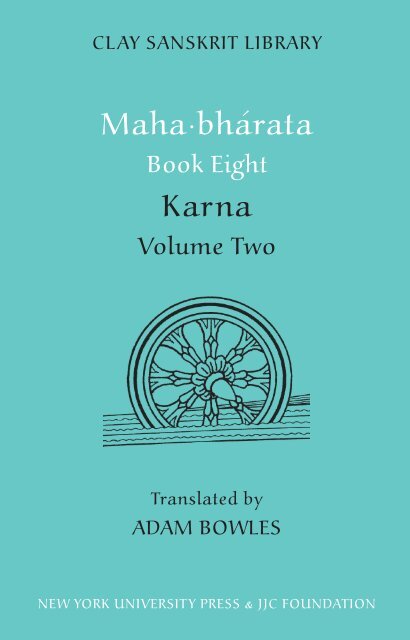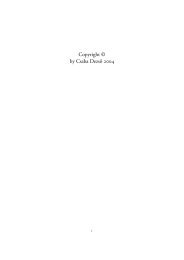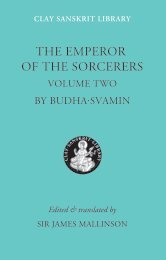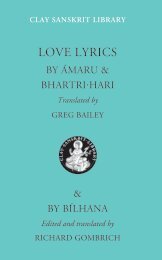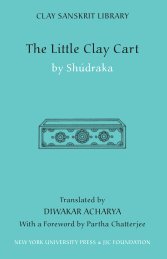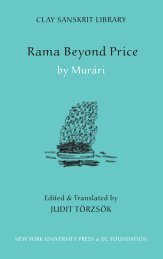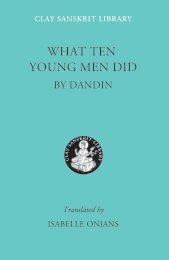The Slaying of Karna - Clay Sanskrit Library
The Slaying of Karna - Clay Sanskrit Library
The Slaying of Karna - Clay Sanskrit Library
You also want an ePaper? Increase the reach of your titles
YUMPU automatically turns print PDFs into web optimized ePapers that Google loves.
CLAY SANSKRIT LIBRARY<br />
Maha·bhárata<br />
Book Eight<br />
<strong>Karna</strong><br />
Volume Two<br />
Translated by<br />
ADAM BOWLES<br />
NEW YORK UNIVERSIT Y PRESS & JJC FOUNDATION
T H E C L A Y S A N S K R I T L I B R A R Y<br />
F O U N D E D B Y J O H N & J E N N I F E R C L A Y<br />
G E N E R A L E D I T O R S<br />
Richard Gombrich<br />
Sheldon Pollock<br />
E D I T E D B Y<br />
Isabelle Onians<br />
Somadeva Vasudeva<br />
www.claysanskritlibrary.com<br />
www.nyupress.org
Artwork by Robert Beer.<br />
Typeset in Adobe Garamond at 10.25 : 12.3+pt.<br />
XML-development by Stuart Brown.<br />
Editorial input from Dániel Balogh,<br />
Tomoyuki Kono & Eszter Somogyi.<br />
Printed in Great Britain by St Edmundsbury Press Ltd,<br />
Bury St Edmunds, Suffolk, on acid-free paper.<br />
Bound by Hunter & Foulis Ltd, Edinburgh, Scotland.
M A H Ā B H Ā R A T A<br />
B O O K E I G H T<br />
K A R .N A<br />
V O L U M E T W O<br />
T R A N S L A T E D B Y<br />
Adam Bowles<br />
N E W Y O R K U N I V E R S I T Y P R E S S<br />
J J C F O U N D A T I O N<br />
2 0 0 8
Copyright © 2008 by the CSL<br />
All rights reserved.<br />
First Edition 2008<br />
e <strong>Clay</strong> <strong>Sanskrit</strong> <strong>Library</strong> is co-published by<br />
New York University Press<br />
and the JJC Foundation.<br />
Further information about this volume<br />
and the rest <strong>of</strong> the <strong>Clay</strong> <strong>Sanskrit</strong> <strong>Library</strong><br />
is available at the end <strong>of</strong> this book<br />
and on the following websites:<br />
www.claysanskritlibrary.com<br />
www.nyupress.org<br />
ISBN-13: 978-0-8147-9995-6 (cloth : alk. paper)<br />
ISBN-10: 0-8147-9995-7 (cloth : alk. paper)<br />
<strong>Library</strong> <strong>of</strong> Congress Cataloging-in-Publication Data<br />
Mahābhārata. Kar .naparva. English & <strong>Sanskrit</strong>.<br />
Mahābhārata. Book eight, Kar .na /<br />
translated by Adam Bowles. -- 1st ed.<br />
p. cm. -- (e <strong>Clay</strong> <strong>Sanskrit</strong> library)<br />
Epic poetry.<br />
In English and <strong>Sanskrit</strong> (romanized) on facing pages;<br />
includes translation from <strong>Sanskrit</strong>.<br />
Includes bibliographical references and index.<br />
ISBN-13: 978-0-8147-9995-6 (cloth : alk. paper)<br />
ISBN-10: 0-8147-9995-7 (cloth : alk. paper)<br />
I. Bowles, Adam. II. Title. III. Title: Kar .na.<br />
BL1138.242.K37E5 2006<br />
294.5'92304521--dc22 2006032852
C O N T E N T S<br />
CSL Conventions vii<br />
Introduction xv<br />
MAHA·BHÁRATA VIII – KARNA II<br />
55–64 e Peril <strong>of</strong> Yudhi·shthira 3<br />
65–74 e Dispute <strong>of</strong> Árjuna and<br />
Yudhi·shthira 123<br />
75–83 e <strong>Slaying</strong> <strong>of</strong> Duhshásana 251<br />
84–96 e <strong>Slaying</strong> <strong>of</strong> <strong>Karna</strong> 369<br />
Notes 563<br />
Emendations to the <strong>Sanskrit</strong> Text 573<br />
Additional Notes to Volume I 579<br />
Proper Names and Epithets 585<br />
Index 597
84–96<br />
THE SLAYING OF KARNA
84.1<br />
84.5<br />
sa .mjaya uvāca:<br />
D u .hśāsane tu nihate, putrās tava mahā|rathā .h,<br />
mahā|krodha|vi.sā vīrā .h, samare.sv a|palāyina .h,<br />
daśa, rājan, mahā|vīryā Bhīma .m prācchādayañ śarai .h.<br />
Ni.sa˙ngī, Kavacī, Pāśī, Da .n .dadhāro, Dhanurdhara .h,<br />
Alolupa .h, Śala.h, .Sa .n .dho, Vātavega|Suvarcasau,<br />
ete sametya sahitā bhrāt.r|vyasana|karśitā .h<br />
Bhīmasena .m mahā|bāhu .m mārga .nai .h samavārayan.<br />
sa vāryamā .no viśikhai .h<br />
samantāt tair mahā|rathai .h,<br />
Bhīma .h krodh’|âgni|rakt’|âk.sa .h,<br />
kruddha .h Kāla iv’ ābabhau.<br />
tā .ms tu bhallair mahā|vegair<br />
daśabhir daśa Bhāratān<br />
rukm’|â˙ngadān rukma|pu˙nkhai .h<br />
Pārtho ninye Yama|k.sayam.<br />
hate.su te.su vīre.su, pradudrāva bala .m tava<br />
paśyata .h sūta|putrasya Pā .n .davasya bhay’|ârditam.<br />
tata .h Kar .no, mahā|rāja, praviveśa mahā|bhayam<br />
d.r.s.tvā Bhīmasya vikrāntam, Antakasya prajāsv iva.<br />
tasya tv ākāra|bhāva|jña .h Śalya.h samiti|śobhana .h<br />
uvāca vacana .m Kar .na .m prāpta|kālam ari .m|damam:<br />
370
sáñjaya said:<br />
But once Duhshásana had been killed, king, ten <strong>of</strong> 84.1<br />
your courageous sons who were poisonous with rage,<br />
mighty warriors and heroes who never retreated in bat-<br />
tle, enveloped Bhima with arrows. Nishángin, Kávachin,<br />
Pashin, Danda·dhara, Dhanur·dhara, Alólupa, Shala, Shan-<br />
dha, Vata·vega and Suvárchas, listless due to the evil crime<br />
against their brother, together drew close to mighty-armed<br />
Bhima·sena and covered him in arrows. Obstructed on all<br />
sides by those mighty warriors with their arrows, Bhima<br />
was as radiant as Time the destroyer in rage, his eyes crim-<br />
son with the fire <strong>of</strong> his fury. With ten high-speed broad- 84.5<br />
headed arrows having nocks <strong>of</strong> gold, Pritha’s son sent those<br />
ten Bháratas sporting golden armlets to Yama’s realm. With<br />
those heroes killed, your army fled, racked with fear <strong>of</strong> the<br />
Pándava, while the charioteer’s son looked on.<br />
<strong>Karna</strong> then began to feel great trepidation, great king,<br />
after seeing the courage <strong>of</strong> Bhima which was like that <strong>of</strong><br />
Death towards living things. Shalya, who dazzled in battle,<br />
recognized what his expression meant and spoke to <strong>Karna</strong>, a<br />
conqueror <strong>of</strong> enemies, these words suitable for the moment:<br />
371
84.10<br />
84.15<br />
maha·bhárata viii – karna ii<br />
«mā vyathā .m kuru, Rādheya! n’ âiva .m tvayy upapadyate.<br />
ete dravanti rājāno Bhīmasena|bhay’|ârditā .h;<br />
Duryodhanaś ca sa .mmū .dho bhrāt.r|vyasana|du .hkhita .h.<br />
Du .hśāsanasya rudhire pīyamāne mah”|ātmanā,<br />
vyāpanna|cetasaś c’ âiva śok’|ôpahata|cetasa .h,<br />
Duryodhanam upāsante parivārya samantata .h<br />
K.rpa|prabh.rtayaś c’ âite hata|śe.sā .h sah’|ôdarā .h.<br />
Pā .n .davā labdha|lak.sāś ca Dhana .mjaya|puro|gamā .h<br />
tvām ev’ âbhimukhā .h śūrā yuddhāya samupāsthitā .h.<br />
sa tva .m, puru.sa|śārdūla, pauru.se .na samāsthita .h<br />
k.satra|dharma .m puras|k.rtya pratyudyāhi Dhana .mjayam!<br />
bhāro hi Dhārtarā.s.tre .na tvayi sarva .h samāhita .h;<br />
tam udvaha, mahā|bāho, yathā|śakti yathā|balam!<br />
jaye syād vipulā kīrtir, dhruva .h svarga .h parājaye.<br />
V.r.sasenaś ca, Rādheya, sa .mkruddhas tanayas tava<br />
tvayi moha .m samāpanne Pā .n .davān abhidhāvati.»<br />
etac chrutvā tu vacana .m Śalyasy’ â|mita|tejasa .h,<br />
h.rdi c’ āvaśyaka .m bhāva .m cakre yuddhāya su|sthiram.<br />
372
the slaying <strong>of</strong> karna 84–96<br />
“Don’t despair, son <strong>of</strong> Radha! It’s not right for you!<br />
Racked with fear <strong>of</strong> Bhima·sena, the kings flee, and Dur-<br />
yódhana is insensible, traumatized by the evil crime against<br />
his brother. Led by Kripa, the remaining warriors and his 84.10<br />
brothers—their minds deranged and overwhelmed by grief<br />
on account <strong>of</strong> that mighty man drinking Duhshásana’s<br />
blood—completely surrounded Duryódhana and sat down<br />
at his side. e Pándava champions have achieved their goal<br />
and, led by Dhanañ·jaya, have turned towards you and ap-<br />
proached for battle. You, tiger <strong>of</strong> men, must apply yourself<br />
with courage and, honoring the warriors’ code, charge out<br />
to meet Dhanañ·jaya! Dhrita·rashtra’s son has placed this<br />
entire burden on you, mighty-armed man, and you must<br />
bear it to the best <strong>of</strong> your ability and strength! In victory<br />
there shall be wide fame and in defeat ever-lasting heaven.<br />
Your son Vrisha·sena, furious on account <strong>of</strong> you becoming 84.15<br />
demoralized, son <strong>of</strong> Radha, has attacked the Pándavas.”<br />
After hearing these words from Shalya, whose fiery en-<br />
ergy had no limit, <strong>Karna</strong> decisively made up his mind that<br />
battle was inevitable.<br />
373
84.20<br />
maha·bhárata viii – karna ii<br />
tata .h kruddho V.r.saseno ’bhyadhāvad<br />
avasthita .m pramukhe Pā .n .dava .m tam<br />
V.rk’|ôdara .m, Kālam iv’ ātta|da .n .da .m,<br />
gadā|hasta .m yodhayanta .m tvadīyān.<br />
tam abhyadhāvan Nakula .h pravīro<br />
ro.sād amitra .m pratudan p.r.satkai .h<br />
Kar .nasya putra .m samare prah.r.s.ta .m,<br />
purā jighā .msur Maghav” êva Jambham.<br />
tato dhvaja .m sphā.tika|citra|kañcuka .m<br />
ciccheda vīro Nakula .h k.sure .na,<br />
Kar .n’|ātmajasy’ ê.sv|asana .m ca citra .m<br />
bhallena jāmbūnada|citra|naddham.<br />
ath’ ânyad ādāya dhanu .h sa śīghra .m<br />
Kar .n’|ātmaja .h Pā .n .davam abhyavidhyat<br />
divyair mah”|âstrair Nakula .m k.rt’|âstro<br />
Du .hśāsanasy’ âpaciti .m yiyāsu .h.†<br />
tata .h kruddho Nakulas ta .m mah”|ātmā<br />
śarair mah”|ôlkā|pratimair avidhyat.†<br />
divyair astrair abhyavidhyac ca so ’pi<br />
Kar .nasya putro Nakula .m k.rt’|âstra .h.<br />
śar’|âbhighātāc ca ru.sā ca, rājan,<br />
svayā ca bhās” âstra|samīra .nāc ca,<br />
jajvāla Kar .nasya suto ’timātram<br />
iddho yath” ājy’|āhutibhir hut’|āśa .h.<br />
Kar .nasya putro Nakulasya, rājan,<br />
sarvān aśvān ak.si .nod uttam’|âstrai .h,<br />
Vanāyu|jān vai Nakulasya śubhrān<br />
udagra|gān hema|jāl’|âvanaddhān.<br />
374
the slaying <strong>of</strong> karna 84–96<br />
en in rage Vrisha·sena rushed at Wolf-belly Pándava<br />
who stood before him fighting your men with club in hand<br />
like Time the destroyer wielding his staff. In that battle the<br />
hero Nákula rushed at <strong>Karna</strong>’s ecstatic son, furiously run-<br />
ning his enemy through with arrows, just as Mághavan had<br />
done long ago in his eagerness to kill the demon Jambha.<br />
With a razor arrow the hero Nákula next cut to pieces the<br />
crystal-speckled cloth banner <strong>of</strong> <strong>Karna</strong>’s son, and with a<br />
broad-headed arrow splintered his bow that was beautifully<br />
inlaid with gold.<br />
Yet <strong>Karna</strong>’s son was skilled with his weapons and, grab- 84.20<br />
bing another fast bow in his eagerness to avenge Duhshá-<br />
sana, wounded Nákula with his powerful divine weapons.<br />
Mighty Nákula was infuriated and he wounded him with<br />
arrows that seemed like massive meteors. And <strong>Karna</strong>’s son,<br />
an expert in weapons, also wounded Nákula with his di-<br />
vine weapons. With a rage brought on by blows from ar-<br />
rows and with his own radiance brought on by his hurling<br />
<strong>of</strong> missiles, <strong>Karna</strong>’s son flared up beyond measure, like a fire<br />
kindled with <strong>of</strong>ferings <strong>of</strong> ghee. King, <strong>Karna</strong>’s son destroyed<br />
all Nákula’s horses with superb missiles—Nákula’s beauti-<br />
ful horses with elevated gaits that were covered in golden<br />
mail and bred in Vanáyu!<br />
375
84.25<br />
84.30<br />
maha·bhárata viii – karna ii<br />
tato hat’|âśvād avaruhya yānād,<br />
ādāya carm’ âmala|rukma|candram,<br />
ākāśa|sa .mkāśam asi .m prag.rhya,<br />
dodhūyamāna .h khagavac cacāra.<br />
tato ’ntarik.se ca rath’|âśva|nāga .m<br />
ciccheda tūr .na .m Nakulaś citra|yodhī;<br />
te prāpatann asinā gā .m viśastā,<br />
yath” âśva|medhe paśava .h śamitrā.<br />
dvi|sāhasrā .h pātitā yuddha|śau .n .dā,<br />
nānā|deśyā .h, su|bh.rtā .h, satya|sa .mdhā .h<br />
ekena śīghra .m Nakulena k.rttā .h<br />
jay’|ēpsun” ân|uttama|candan’|â˙ngā .h.<br />
tam āpatanta .m Nakula .m so ’bhipatya<br />
samantata .h sāyakai .h pratyavidhyat.<br />
sa tudyamāno Nakula .h p.r.satkair<br />
vivyādha vīra .m. sa cukopa viddha .h.<br />
mahā|bhaye rak.syamā .no mah”|ātmā<br />
bhrātrā Bhīmen’ âkarot tatra bhīmam.<br />
ta .m Kar .na|putro vyadhamantam eka .m<br />
nar’|âśva|māta˙nga|rathān an|ekān<br />
krī .dantam a.s.tā|daśabhi .h p.r.satkair<br />
vivyādha vīra .m Nakula .m su|ro.sa .h.<br />
sa tena viddho ’tibh.rśa .m tarasvī<br />
mah”|āhave V.r.sasenena, rājan,<br />
kruddhena dhāvan samare jighā .msu .h<br />
Kar .n’|ātmaja .m Pā .n .du|suto n.r|vīra .h.<br />
vitatya pak.sau sahasā patanta .m<br />
śyena .m yath” âiv’ āmi.sa|lubdham ājau,<br />
avākirad V.r.sasenas tatas ta .m<br />
śitai .h śarair Nakulam udāra|vīryam.<br />
376
the slaying <strong>of</strong> karna 84–96<br />
With its horses dead he then leaped from his vehicle and,<br />
seizing his shield decorated with spotless golden moons and<br />
grabbing his sky-like sword, he flew <strong>of</strong>f like a bird, waving<br />
them ferociously. And then, employing various martial 84.25<br />
arts through the air, Nákula quickly cut up chariots, horses<br />
and elephants. Dismembered by his sword, they collapsed<br />
to the ground like animals in a horse sacrifice cut up by the<br />
carver. Two thousand well paid men from various places<br />
who were true to their promises, keen for battle and whose<br />
bodies were sprinkled with the finest sandal, were singlehandedly<br />
felled and quickly cut up by Nákula in his hunger<br />
for victory.<br />
As Nákula flew towards him Vrisha·sena ran at him and<br />
wounded him all over with arrows. Yet while he was being<br />
punished, Nákula wounded that hero with arrows.<br />
Wounded, Vrisha·sena boiled with rage. Mighty Nákula<br />
terrorized that place while his brother Bhima protected<br />
him whenever there was serious danger. <strong>Karna</strong>’s furious son<br />
wounded Nákula with eighteen arrows as that hero cavorted<br />
about and struck down many men, horses, elephants and<br />
chariots on his own.<br />
ough he was horribly wounded by Vrisha·sena in that<br />
great battle, king, Pandu’s bold son—a hero <strong>of</strong> a man!—<br />
continued furiously running at him in that fight in his eagerness<br />
to kill <strong>Karna</strong>’s son. Vrisha·sena then sprayed that 84.30<br />
man <strong>of</strong> immense courage with sharp arrows as Nákula flew<br />
at him like an eagle spreading its wings and flying over<br />
the battlefield in search <strong>of</strong> prey. Nákula took various paths<br />
with his sword, rendering the waves <strong>of</strong> Vrisha·sena’s arrows<br />
ineffective.<br />
377
84.35<br />
maha·bhárata viii – karna ii<br />
sa tān moghā .ms tasya kurvañ śar’|âughā .mś<br />
cacāra mārgān Nakulaś citra|rūpān.<br />
ath’ âsya tūr .na .m carato, nar’|êndra,<br />
kha .dgena citra .m Nakulasya tasya<br />
mah”|ê.subhir vyadhamat Kar .na|putro<br />
mah”|āhave carma sahasra|tāram.<br />
ta .m c’ āyasa .m, niśita .m tīk.s .na|dhāram,<br />
vikośam, ugra .m, guru|bhāra|sāham,<br />
dvi.sac|charīr’|ânta|kara .m, su|ghoram<br />
ādhunvata .h, sarpam iv’ ôgra|rūpam,<br />
k.sipra .m śarai .h .sa .dbhir amitra|sāhaś<br />
cakarta kha .dga .m niśitai .h su|vegai .h,<br />
punaś ca dīptair niśitai .h p.r.satkai .h<br />
stan’|ântare gā .dham ath’ âbhyavidhyat.<br />
k.rtvā tu tad du.s|karam ārya|ju.s.ta .m<br />
anyair narai .h karma ra .ne mah”|ātmā<br />
yayau ratha .m Bhīmasenasya, rājañ,<br />
śar’|âbhitapto Nakulas tvarāvān.<br />
sa Bhīmasenasya ratha .m hat’|âśvo<br />
Mādrī|suta .h Kar .na|sut’|âbhitapta .h<br />
āpupluve, si .mha iv’ âcal’|âgra .m,<br />
378<br />
sa .mprek.syamā .nasya Dhana .mjayasya.
the slaying <strong>of</strong> karna 84–96<br />
With huge arrows <strong>Karna</strong>’s son destroyed Nákula’s shield<br />
that was covered in a thousand stars as he speedily and spec-<br />
tacularly careered onwards with his sword in hand. And as<br />
Nákula waved his keen and formidable unsheathed sword,<br />
a terrifying weapon capable <strong>of</strong> immense tasks that could<br />
destroy the bodies <strong>of</strong> enemies like a fearsome snake, that<br />
vanquisher <strong>of</strong> enemies quickly cut down that sword with<br />
six sharp and fast shafts and, furthermore, badly wounded<br />
him in the center <strong>of</strong> the chest with sharp blazing arrows.<br />
After performing such deeds that were admired by no-<br />
ble people and which were difficult for other men, king, in<br />
the battle mighty Nákula, seared by arrows, hastily went to<br />
Bhima·sena’s chariot. His horses dead and seared by <strong>Karna</strong>’s 84.35<br />
son, like a lion on to the summit <strong>of</strong> a mountain Madri’s son<br />
sprang into Bhima·sena’s chariot while Dhanañ·jaya was<br />
watching.<br />
379
84.40<br />
maha·bhárata viii – karna ii<br />
tata .h kruddho V.r.saseno mah”|ātmā<br />
vavar.sa tāv i.su|jālena vīra .h,<br />
mahā|rathāv eka|rathe sametau<br />
śarai .h prabhindann iva Pā .n .daveyau.<br />
tasmin rathe nihate Pā .n .davasya<br />
k.sipra .m ca kha .dge viśikhair nik.rtte,<br />
anye ca sa .mhatya Kuru|pravīrās<br />
tato nyaghnañ śara|var.sair upetya.<br />
tau Pā .n .daveyau parita .h sametān,<br />
sa .mhūyamānāv iva havya|vāhau,<br />
Bhīm’|Ârjunau V.r.sasenāya kruddhau<br />
vavar.satu .h śara|var.sa .m su|ghoram.<br />
ath’ âbravīn Māruti .h Phalguna .m ca,<br />
«paśyasv’ âina .m Nakula .m pī .dyamānam!<br />
aya .m ca no bādhate Kar .na|putras,<br />
tasmād bhavān pratyupayātu Kār .nim!»<br />
sa tan niśamy’ âiva vaca .h Kirī.tī<br />
ratha .m samāsādya V.rk’|ôdarasya,<br />
ath’ âbravīn Nakulo vīk.sya vīram<br />
upāgata .m, «śātaya śīghram enam!»<br />
ity eva .m ukta .h sahasā Kirī.tī<br />
bhrātrā samak.sa .m Nakulena sa .mkhye,<br />
kapi|dhvaja .m Keśava|sa .mg.rhīta .m<br />
380<br />
prai.sīd udagro V.r.sasenāya vāham.
the slaying <strong>of</strong> karna 84–96<br />
Vrisha·sena was then furious and with a spread <strong>of</strong> arrows<br />
that mighty hero rained down on both <strong>of</strong> them and almost<br />
ran through each Pándava with shafts as those mighty war-<br />
riors huddled together on the one chariot. When the Pán-<br />
dava’s chariot had been destroyed and the sword quickly<br />
cut to pieces by arrows, other Kuru heroes joined together<br />
and then attacked, striking them with showers <strong>of</strong> arrows.<br />
Like a pair <strong>of</strong> sacrificial fires being fueled with oblations, the<br />
two furious Pándavas Bhima and Árjuna rained a dreadful<br />
shower <strong>of</strong> arrows down on Vrisha·sena and all over those<br />
who had joined together there.<br />
e son <strong>of</strong> the Wind-god then said to Phálguna, “Look!<br />
Nákula’s being hard pressed! <strong>Karna</strong>’s son hampers us, so<br />
you’ll have to counterattack <strong>Karna</strong>’s boy!” When he heard 84.40<br />
these words, the Wearer <strong>of</strong> the crown drew near Wolf-belly’s<br />
chariot. en Nákula saw that hero approach and said, “Kill<br />
him quickly!”<br />
Spoken to like this in the battle by his brother Nákula<br />
who stood before him, the fierce Wearer <strong>of</strong> the crown urged<br />
on his monkey-bannered vehicle steered by Késhava to-<br />
wards Vrisha·sena.<br />
381
85.1<br />
maha·bhárata viii – karna ii<br />
sa .mjaya uvāca:<br />
Nakulam atha viditvā chinna|bā .nāsan’|âsi .m,<br />
viratham, ari|śar’|ārta .m, Kar .na|putr’|âstra|bhagnam,<br />
pavana|dhuta|patākā, hrādino, valgit’|âśvā,<br />
vara|puru.sa|niyuktās te rathā .h śīghram īyu .h,<br />
Drupada|suta|vari.s.thā .h pañca, Śaineya| .sa.s.thā,<br />
Drupada|duhit.r|putrā .h pañca c’ âmitra|sāhā .h,<br />
dvirada|ratha|nar’|âśvān sūdayantas tvadīyān<br />
bhujaga|pati|nikāśair mārga .nair ātta|śastrā .h.<br />
atha tava ratha|mukhyās tān pratīyus tvaranto<br />
K.rpa|H.rdika|sutau ca, Drau .ni|Duryodhanau ca,<br />
Śakuni|suta|V.rkāś ca, Krātha|Devāv.rdhau ca<br />
dvirada|jalada|gho.sai .h syandanai .h kārmukaiś ca.<br />
tava, n.rpa, rathi|vīrās† tān daś’|âika .m ca vīrān,<br />
n.r|vara, śara|var’|âgryais† tā .dayanto ’bhyarundhan.<br />
nava|jalada|savar .nair hastibhis tān udīyur<br />
giri|śikhara|nikāśair bhīma|vegai .h Kulindā .h.<br />
i Dráupadi, who had one son to each <strong>of</strong> the five Pándavas<br />
382
the slaying <strong>of</strong> karna 84–96<br />
sáñjaya said:<br />
<strong>The</strong>nwhen they realized that Nákula had been injured 85.1<br />
by his foe’s arrows, stripped <strong>of</strong> his chariot, routed by the<br />
weapons <strong>of</strong> <strong>Karna</strong>’s son and that his bow and sword had<br />
been splintered, raucous chariots driven by the finest men<br />
quickly arrived with their horses galloping and their flags<br />
buffeted by the wind. e five superb sons <strong>of</strong> Drúpada, a<br />
sixth in Shini’s grandson, and the five enemy conquering<br />
sons <strong>of</strong> Drúpada’s daughter i wielded their weapons and de-<br />
stroyed your elephants, chariots, men and horses with ar-<br />
rows that were like snake-lords.<br />
en on their elephants and chariots that thundered<br />
like clouds your foremost warriors Kripa, Hrídika’s son,<br />
Drona’s son, Duryódhana, Shákuni’s son, Vrika, Kratha<br />
and Devávridha* quickly went out to meet them with their<br />
bows. en, king, your heroic chariot-warriors repulsed all<br />
eleven heroes, finest <strong>of</strong> men, pounding them with the very<br />
finest arrows. But Kulíndas rose up against them on ele-<br />
phants <strong>of</strong> fearsome speed that had the color <strong>of</strong> new clouds<br />
and that seemed like the peaks <strong>of</strong> mountains.<br />
383
maha·bhárata viii – karna ii<br />
85.5 su|kalpitā Haimavatā mad’|ôtka.tā<br />
ra .n’|âbhikāmai .h k.rtibhi .h samāsthitā .h<br />
suvar .na|jālair vitatā babhur gajās<br />
tathā, yathā khe jala|dā .h sa|vidyuta .h.<br />
Kulinda|putro daśabhir mah”|âyasai .h<br />
K.rpa .m sa|sūt’|âśvam apī .dayad bh.rśam.<br />
tata .h Śaradvat|suta|sāyakair hata .h<br />
sah’ âiva nāgena papāta bhūtale.<br />
Kulinda|putr’|âvara|jas tu tomarair<br />
divākar’|â .mśu|pratimair ayas|mayai .h<br />
ratha .m ca vik.sobhya nanāda; nardatas<br />
tato ’sya Gāndhāra|pati .h śiro ’harat.<br />
tata .h Kulinde.su hate.su te.sv atha<br />
prah.r.s.ta|rūpās tava te mahā|rathā .h<br />
bh.rśa .m pradadhmur lava .n’|âmbu|sa .mbhavān,<br />
parā .mś ca bā .n’|âsana|pā .nayo ’bhyayu .h.<br />
85.10<br />
ath’ âbhavad yuddham at’|îva dāru .na .m<br />
puna .h Kurū .nā .m saha Pā .n .du|S.rñjayai .h<br />
śar’|âsi|śakty| .r.s.ti|gadā|paraśvadhair<br />
nar’|âśva|nāg’|âsu|hara .m bh.rś’|ākulam.<br />
rath’|âśva|māta˙nga|padātibhis tata .h<br />
paraspara .m viprahat” âpatan†* k.sitau,<br />
yathā sa|vidyut|stanitā balāhakā .h<br />
samāhatā digbhya iv’ ôgra|mārutai .h.<br />
i Shákuni<br />
384
the slaying <strong>of</strong> karna 84–96<br />
Mounted by skilled men keen for a fight, those ruttish 85.5<br />
and well-equipped Himalayan elephants encased in golden<br />
mail were as dazzling as clouds in the sky filled with light-<br />
ning. A Kulínda prince badly hurt Kripa and his charioteer<br />
and horses with ten huge iron weapons. en Sharádvat’s<br />
son struck him with arrows and he collapsed to the ground<br />
with his elephant. But a younger brother <strong>of</strong> the Kulínda<br />
prince rocked his chariot with lances made <strong>of</strong> iron that were<br />
like rays <strong>of</strong> the sun and then roared. But while he was roar-<br />
ing, the lord <strong>of</strong> Gandhára i then lopped <strong>of</strong>f his head. Once<br />
these Kulíndas were killed, those mighty warriors <strong>of</strong> yours<br />
were in rapture and blew their ocean-born conches and then<br />
attacked their enemies with bows in hand.<br />
Again there was a terribly violent and appallingly chaotic<br />
battle between the Kurus and the Pándavas and Sríñjayas<br />
which stole the lives <strong>of</strong> men, horses and elephants with ar-<br />
rows, swords, spears, javelins, clubs and axes. ey struck 85.10<br />
one another with their chariots, horses, elephants and foot-<br />
soldiers and collapsed to the ground like clouds filled with<br />
thunder and lightning struck by formidable winds from ev-<br />
ery direction.<br />
385
85.15<br />
maha·bhárata viii – karna ii<br />
tata .h Śatānīka|hatān† mahā|gajā .ms,<br />
tathā rathān, patti|ga .nā .mś ca tān bahūn;<br />
jaghāna Bhojas tu hayān; ath’ âpatan<br />
k.sanād viśastā .h K.rtavarma .na .h śarai .h.<br />
ath’ âpare Drau .ni|hatā mahā|dvipās<br />
traya .h sa|sarv’|āyudha|yodha|ketanā .h<br />
nipetur urvyā .m vyasavo nipātitās<br />
tathā, yathā vajra|hatā mah”|âcalā .h.<br />
Kulinda|rāj’|âvara|jād anantara .h<br />
stan’|ântare patri|varair atā .dayat<br />
tav’ ātma|ja .m; tasya tav’ ātma|ja .h śarai .h<br />
śitai .h śarīra .m vyahanad, dvipa .m ca tam.<br />
sa nāga|rāja .h saha rāja|sūnunā<br />
papāta, rakta .m bahu sarvata .h k.saran,<br />
Mahendra|vajra|prahato ’mbud’|āgame<br />
yathā jala .m gairika|parvatas, tathā.<br />
Kulinda|putra|prahito ’paro dvipa .h<br />
Krātha .m sa|sūt’|âśva|ratha .m vyapothayat;<br />
tato ’patat Krātha|śar’|âbhidhāvita .h<br />
sah’|ēśvaro, vajra|hato yathā giri .h.<br />
rathī dvipa|sthena hato ’patac charai .h<br />
Krāth’|âdhipa .h parvata|jena dur|jaya .h<br />
sa|vāji|sūt’|ê.sv|asana|dhvajas tathā,<br />
386<br />
yathā mahā|vāta|hato mahā|druma .h.
the slaying <strong>of</strong> karna 84–96<br />
Next many mighty elephants, chariots and divisions <strong>of</strong><br />
foot-soldiers were slain by Shataníka.* But the Bhoja Krita·<br />
varman then killed his horses and they immediately col-<br />
lapsed, dismembered by his arrows. en three other mas-<br />
sive elephants with all their weapons, warriors and flags<br />
were struck by Drona’s son and fell to the ground lifeless<br />
like huge mountains struck by thunderbolts.<br />
e next <strong>of</strong> kin to the Kulínda king’s younger brother<br />
wounded your son in the center <strong>of</strong> the chest with fine<br />
arrows. With his sharp arrows, your son struck his body<br />
and his elephant. at king <strong>of</strong> elephants collapsed together<br />
with the prince, streaming all over with copious amounts<br />
<strong>of</strong> blood like a red ocher mountain struck by mighty In-<br />
dra’s thunderbolts and streaming water under a newly ar-<br />
rived cloud.<br />
Another elephant urged on by a Kulínda prince crushed 85.15<br />
Kratha along with his charioteer, horses and chariot. en<br />
along with its lord it was assailed by Kratha’s arrows and<br />
collapsed like a mountain struck by a thunderbolt. at in-<br />
domitable chariot-warrior the lord <strong>of</strong> the Krathas had been<br />
struck with arrows by that mountain-born warrior strad-<br />
dling his elephant and he collapsed with his horses, char-<br />
ioteer, bow and banners, like a huge tree swept aside by a<br />
powerful wind.<br />
387
maha·bhárata viii – karna ii<br />
V.rko dvipa|stha .m giri|rāja|vāsina .m<br />
bh.rśa .m śarair dvādaśabhi .h parābhinat.<br />
tato V.rka .m s’|âśva|ratha .m mahā|dvipo<br />
druta .m caturbhiś cara .nair vyapothayat.<br />
sa nāga|rāja .h sa|niyant.rko ’patat<br />
tathā hato Babhru|sut’|ê.subhir bh.rśam.<br />
sa c’ âpi Devāv.rdha|sūnur ardita .h<br />
papāta nunna .h Sahadeva|sūnunā.<br />
vi.sā .na|gātr’|âvara|yodha|pātinā<br />
gajena hantu .m Śakuni .m Kulinda|ja .h<br />
jagāma vegena bh.rś’ ârdaya .mś ca ta .m.<br />
tato ’sya Gāndhāra|pati .h śiro ’harat.<br />
85.20 tata .h Śatānīka|hatā mahā|gajā,<br />
hayā, rathā .h, patti|ga .nāś ca tāvakā .h,<br />
Supar .na|vāta|prahatā yath” ôragās,<br />
tathā gatā gām vivaśā vicūr .nitā .h.<br />
tato ’bhyavidhyad bahubhi .h śitai .h śarai .h<br />
Kali˙nga|putro Nakul’|ātmaja .m smayan.<br />
tato ’sya kopād vicakarta Nākuli.h<br />
śira .h k.sure .n’ âmbuja|sa .mnibh’|ānanam.<br />
tata .h Śatānīkam avidhyad āyasais<br />
tribhi .h śitai .h Kar .na|suto, ’rjuna .m tribhi .h,<br />
tribhiś ca Bhīma .m, Nakula .m ca saptabhir,<br />
Janārdana .m dvādaśabhiś ca sāyakai .h.<br />
tad asya karm’ âtimanu.sya|karma .na .h<br />
samīk.sya h.r.s.tā .h Kuravo ’bhyapūjayan;<br />
parākrama|jñās tu Dhana .mjayasya ye,<br />
«huto ’yam agnāv! iti» ta .m tu menire.<br />
i Shruta·karman ii Babhru<br />
388
the slaying <strong>of</strong> karna 84–96<br />
With twelve arrows Vrika brutally penetrated that elephant<br />
riding warrior who lived on the king <strong>of</strong> mountains.<br />
But then that mighty elephant quickly crushed Vrika and<br />
his horses and chariot with all four <strong>of</strong> his feet. Brutally<br />
struck by arrows from Babhru’s son that king <strong>of</strong> elephants<br />
collapsed with its mahout. But, wounded and driven back<br />
by Saha·deva’s son, i Devávridha’s son ii fell.<br />
A Kulínda prince sped towards Shákuni to kill him, brutally<br />
assaulting him with his elephant that could fell warriors<br />
with its tusks or its limbs. e lord <strong>of</strong> Gandhára then<br />
removed his head.<br />
en mighty elephants, horses, chariots and hordes <strong>of</strong> 85.20<br />
your foot-soldiers were struck down by Shataníka and, like<br />
snakes swept aside by the wind <strong>of</strong> Supárna’s wings, fell to<br />
the ground helpless and crushed. Next a grinning Kalínga<br />
prince wounded Nákula’s son with many sharp arrows.<br />
With a razor arrow Nákula’s boy then furiously tore <strong>of</strong>f his<br />
head with its lotus-like mouth.<br />
<strong>Karna</strong>’s son then pummeled Shataníka with three iron<br />
arrows, Árjuna with three arrows, Bhima with three, Nákula<br />
with seven and Janárdana with twelve. As they witnessed<br />
this deed <strong>of</strong> that man <strong>of</strong> superhuman deeds, the Kurus were<br />
exhilarated and paid tribute to him. But those who knew<br />
<strong>of</strong> Dhanañ·jaya’s strength reckoned he was an <strong>of</strong>fering for a<br />
sacrificial fire!<br />
389
clay sanskrit library<br />
WWW.CLAYSANSKRITLIBRARY.COM<br />
“<strong>Karna</strong>,” Book Eight <strong>of</strong> the Maha·bhárata, ends as it<br />
began with <strong>Karna</strong>’s death. In this key second volume<br />
much <strong>of</strong> the quarrel provoked during the dicing comes<br />
full circle, and much <strong>of</strong> the slight suffered by the five<br />
Pándava brothers – and especially by Dráupadi,<br />
their common wife – is avenged.<br />
NEW YORK UNIVERSITY PRESS<br />
Washington Square<br />
New York, NY 10003<br />
www.nyupress.org<br />
ISBN 978-0-8147-9995-6<br />
90000<br />
9 780814 799956


